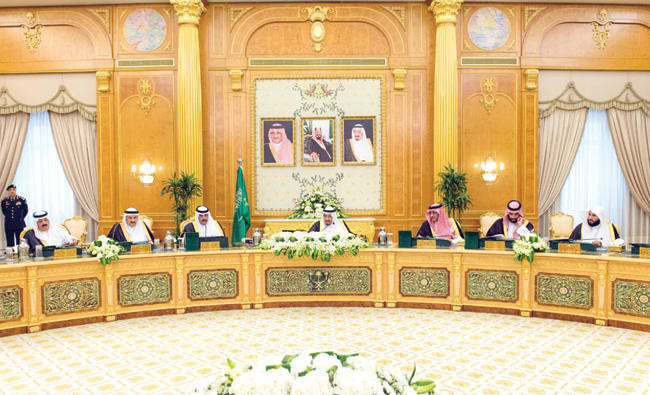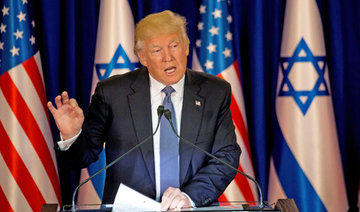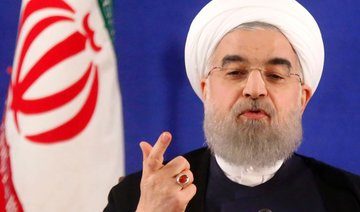RIYADH: King Salman thanked US President Donald Trump and leaders of Arab and Islamic countries who participated in the Gulf Cooperation Council (GCC) consultative meeting, the GCC-US Summit and the Arab-Islamic-American Summit hosted by Riyadh.
Addressing a regular Cabinet meeting at Al-Yamamah Palace in Riyadh on Monday, the king said the summits embodied the keenness of participating countries to face various challenges and achieve peace, security and stability.
The historic agreement signed by the GCC countries with the US, and the establishment in Riyadh of a center for combating terrorism, came as an extension of efforts exerted against terrorism, he added.
The aim of the Global Center for Combating Extremist Ideology (Etidal) is to spread moderation and immunize families and communities from extremism, he said.
Talks with Trump and between high-ranking Saudi and US officials, discussion of the latest regional and global developments, and the signing of a joint strategic vision and of trade and investment deals worth $280 billion represent a turning point in bilateral ties, the king said.
The Cabinet said the hosting of the summits reflected the respect enjoyed by the Kingdom internationally, its keenness to bolster cooperation with friendly countries, and its leading role in facing terrorism and boosting peace, security and stability regionally and globally.
The Cabinet thanked King Salman for his address at the Arab-Islamic-American Summit, and noted Trump’s keenness to strengthen ties with the Arab and Islamic worlds.
It recalled the king’s stress on the responsibility of Arab and Islamic countries to join hands against evil and extremism, in line with Islamic teachings based on peace and moderation.
The Cabinet lauded his call for efforts to eradicate terrorism, achieve peace between the Palestinians and Israelis, find a solution to the Syrian crisis, and stop the exploitation of Islam as a means to instigate hatred, extremism, terrorism, and religious and sectarian conflicts, as Tehran, its affiliates and other terrorist organizations are doing.
The launch of Etidal embodies the Kingdom’s major and continued efforts against terrorism, the Cabinet said.
It thanked Trump for stressing the need to eradicate terrorism and dry up its sources, form new partnerships for regional and global peace and prosperity, and an alliance of countries against extremism.
The Cabinet expressed appreciated for the Riyadh Declaration, which was issued at the end of the Arab-Islamic-American Summit, notably the parts calling for close partnership between the US, Arab and Islamic countries against extremism and terrorism, bolstering cooperation and coexistence between faiths and cultures, countering sectarian agendas and interference in countries’ internal affairs, and enhancing joint action against piracy.
Locally, the Cabinet was briefed on preparations by different government sectors to serve Umrah pilgrims and visitors of the Two Holy Mosques during Ramadan.
The Cabinet condemned the attack on a security patrol in Al-Masoura district, Qatif province, which resulted in the martyrdom of a soldier and the injury of five security men.
It lauded the announcement by the Public Investment Fund (PIF) on the establishment of Saudi Arabian Military Industries (SAMI), which the Cabinet said will allow the Kingdom to localize 50 percent of the government’s military spending by 2030.
It thanked King Salman for his directives for a quick response to combat and contain cholera in Yemen, and to protect the Yemeni people from the disease.
The Cabinet approved a memorandum of understanding (MoU) for cooperation between the Saudi and Japanese governments on implementing Vision 2030.
It approved two MoUs on cooperation between the Saudi Ministry of Energy, Industry and Mineral Resources, and Japan’s Ministry of Economy, Trade and Industry.
The Cabinet authorized the education minister, or whomever he authorizes, to discuss with Sweden an MoU on scientific and educational cooperation between the two countries’ education ministries.
The Cabinet authorized the minister of labor and social development, or whomever he authorizes, to discuss with Azerbaijan an MoU between the Saudi and Azeri labor ministries.
It authorized the minister of energy, industry and natural resources, or whomever he authorizes, to discuss with Sweden an MoU on scientific and technical cooperation between the two governments.
The Cabinet assigned the Electricity & Cogeneration Regulatory Authority (ECRA) to undertake the organization of water and sewage services, and approved the name-change of the Irrigation and Sewage Authority in Ahsa to the Public Authority of Irrigation.
Riyadh summits embodied keenness to achieve security, stability, says King Salman
Riyadh summits embodied keenness to achieve security, stability, says King Salman

Saudi fashion event highlights retail trends, youth culture, and digital innovation

- Speakers noted that the increase in entertainment activities such as concerts and dining in the Kingdom in recent years has led to higher demand for fashion products because people are looking for ways to express themselves
RIYADH: A Riyadh fashion seminar on Sunday brought together industry leaders and creatives to explore the future of Saudi Arabia’s fashion economy.
Hosted by Chalhoub Group at Lakum Art Space, the event featured keynote presentations, panel discussions, and displays by 10 emerging Saudi designers from The Fashion Lab Cohort 2.

The agenda focused on three main themes: the evolution of fashion retail in the Kingdom; the role of cultural identity in building brands; and the rising importance of digital fashion and collaboration.
An awards ceremony honored the standout talents of this year’s cohort: APOA, Awaken, Bucketbox, Mona Al-Shebil, Noble & Fresh, Nora Al-Shaikh, Rebirth, Samar Nasraldin, The Untitled Project and USCITA.
FASTFACT
Hosted by Chalhoub Group at Lakum Art Space, the event featured keynote presentations, panel discussions, and displays by 10 emerging Saudi designers from The Fashion Lab Cohort 2.
One discussion explored consumer behavior in Saudi Arabia, revealing that the local market continues to grow despite global slowdowns.

Speakers noted that the increase in entertainment activities such as concerts and dining in the Kingdom in recent years has led to higher demand for fashion products because people are looking for ways to express themselves.
Retail experiences — both physical and digital — were emphasized as key to engaging Saudi consumers.

Youth culture, streetwear and sports are shaping brand narratives, a panel heard. Speakers discussed how fashion is being used as a tool for cultural storytelling, with an emphasis on grassroots creativity and community building.
Another topic highlighted the power of collaboration between local and international brands. Panelists discussed the importance of long-term partnerships, manufacturing localization, and mentorship to bridge gaps in knowledge and infrastructure.
Speakers also addressed the future of digital fashion, including virtual design, retail innovation, and new marketing strategies targeting Gen Z.
Saudi Arabia’s growing role in shaping the regional and global fashion economy was a prominent theme of the discussions.
First Saudi-Maldives forum to tackle transparency, governance in tourism

- Discussions aim to support sustainable development, promote safe tourism environment
RIYADH: Saudi Arabia — in partnership with the Maldives — is organizing the tourism sector’s inaugural Saudi-Maldives International Forum on Integrity, which is set to take place in the Maldives from May 6 to 7.
The forum is jointly organized by Saudi Arabia’s Oversight and Anti-Corruption Authority, and the Maldives’ Anti-Corruption Commission, in cooperation with the Organisation of Islamic Cooperation.
It will cover key topics such as enhancing transparency and governance in the tourism sector, combating corruption, and boosting international partnerships and expertise exchange among member states and regional and international organizations.
The discussions aim to support sustainable development and promote a trustworthy and safe tourism environment, the Saudi Press Agency reported.
The forum is expected to attract international participation from more than 40 countries and 10 regional and international organizations.
Attendees will include ministers, heads, and representatives of anti-corruption bodies from OIC member states, as well as key international organizations like the UN Office on Drugs and Crime, Interpol, the Global Operational Network of Anti-Corruption Law Enforcement Authorities, and the UN Development Programme. Local and international experts will also take part.
Organizing the forum reflects Saudi Arabia’s commitment to global efforts promoting transparency and accountability in tourism, according to the SPA.
The event highlights Saudi Arabia’s recognition of tourism as a key driver of sustainable development, in line with Vision 2030. It aims to build a thriving tourism sector, diversify national income sources, and stimulate economic growth.
Saudi deputy minister receives Pakistan’s ambassador

- They discussed bilateral relations as well as prominent developments in regional and international arenas
RIYADH: Saudi Deputy Minister for Foreign Affairs Waleed Elkhereiji received Pakistan’s Ambassador to the Kingdom Ahmed Farooq in Riyadh on Sunday.
During the meeting, they discussed bilateral relations as well as prominent developments in regional and international arenas, the Foreign Ministry wrote on X.
Meanwhile, Saudi Deputy Minister for International Multilateral Affairs Abdulrahman Al-Rassi received EU Ambassador to Saudi Arabia Christophe Varno in Riyadh.
Iraqi president invites King Salman to upcoming Arab summits in Baghdad

- Invitation was delivered to Foreign Minister Prince Faisal bin Farhan by Iraqi counterpart
RIYADH: King Salman received an official invitation from Iraqi President Abdullatif Jamal Rashid on Sunday to attend the 34th regular session of the Arab League Council at the summit level, as well as the fifth Arab Economic and Social Development Summit, both set to be hosted by Iraq later this month.
The invitation was delivered to Foreign Minister Prince Faisal bin Farhan during a meeting in Riyadh with Iraqi Deputy Prime Minister and Foreign Minister Fuad Mohammed Hussein, the Saudi Press Agency reported.
The two officials discussed ties between the two countries and reviewed key regional and international developments.
The meeting was also attended by Saud Al-Sati, Undersecretary of the Ministry for Political Affairs.
Riyadh conference discusses future of occupational health

- Minister launches initiatives to enhance Kingdom’s workplace safety
RIYADH: The seventh Global Occupational Safety and Health Conference opened in Riyadh on Sunday under the theme “The Future of Occupational Safety and Health.”
The three-day event was inaugurated by Ahmed Al-Rajhi, minister of human resources and social development and chairman of the National Council for Occupational Safety and Health.
Al-Rajhi launched initiatives to enhance Saudi Arabia’s occupational safety and health system, including the establishment of the National Institute for Occupational Safety and Health, the National Compliance and Excellence Incentives Program, and the Occupational Safety and Health Standards Guide.
Al-Rajhi said that work-related deaths in Saudi Arabia have dropped to less than one per 100,000 workers since the council’s establishment.
Meanwhile, the number of locals in occupational safety and health roles has risen by 130 percent, reaching more than 29,000 by the end of 2024, compared with 2022.
Al-Rajhi also highlighted improvements in safety compliance and automation. “The compliance rate with safety standards reached 72 percent by the end of 2024, and the automation of safety procedures exceeded 62 percent, up from 30 percent in 2020.”
The conference draws high-ranking officials, experts and specialists from Saudi Arabia and worldwide to discuss the future of occupational safety and health, as well as the challenges and opportunities in global labor markets.
It covers six key themes: workplace sustainability; digitization and technology in occupational safety; the economics of safety; the future of research and innovation; emerging challenges; and human behavior and safety culture.
This focus reflects Saudi Arabia’s commitment to improving work environments and achieving professional standards in line with global best practices, a key goal of Saudi Vision 2030.
The event highlights national efforts, displays modern technical trends, supports specialized research, and promotes the Kingdom’s legislative framework to international standards, contributing to the success of major national projects.
Al-Rajhi referred to international reports on workplace challenges. “International reports highlight the serious challenges facing work environments globally. Approximately 3 million worker deaths are recorded each year due to accidents and occupational diseases.”
He said about “395 million non-fatal work injuries occur annually. Statistics show 23 million injuries and 19,000 deaths from heat stress, and 15 percent of workers globally suffer from mental disorders related to stressful work environments.”
The conference program includes specialized scientific sessions, 60 workshops, 20 dialogue sessions, and the Global Occupational Safety and Health Hackathon, where 30 innovative projects are being presented.
An accompanying exhibition features local and international organizations, with several significant agreements expected and new initiatives to advance the Kingdom’s occupational safety system.
The ministry also emphasized the Kingdom’s commitment to securing a healthy work environment and ensuring worker safety, which enhances labor market competitiveness and overall quality of life.
Al-Rajhi said: “In line with Vision 2030, we aim to make work environments safer, higher quality, and more attractive. This supports employee well-being, boosts labor market competitiveness, and fosters a culture of safety and sustainability. Therefore, the Kingdom established the National Council for Occupational Safety and Health.”
The General Organization for Social Insurance launched a directory for occupational safety and health standards at the conference, serving as a unified reference for specialists, establishments, and relevant entities in the Kingdom.
This initiative aims to enhance safety and health standards while protecting workers from occupational hazards, as part of its broader strategy.
Based on international best practices, the directory provides clear preventive standards to help reduce injuries and hazards.
It covers more than 4,500 standards in six main sectors: public industries; construction; agriculture; maritime activities; transport; and mining. It also classifies more than 70 sectors based on the national directory of economic activities.






















